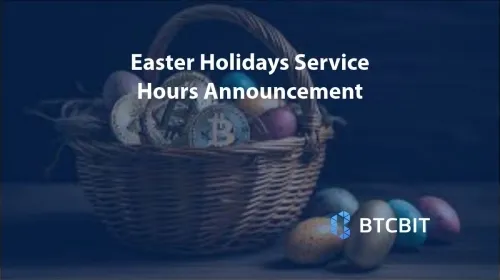
28 Şub 2019 ∙ Articles
The Main Benefits of Centralized Exchanges
4 dakika
The two biggest groups of cryptocurrency exchanges are centralized exchanges (like BTCBIT.net) and decentralized exchanges (like EtherDelta, Bibox etc.). A decentralized exchange (or a “DEX”, for short), do not store funds for its users. Rather, deals are made through smart contracts and atomic swaps so that currency never passes through the hands of an escrow service – it’s just peer-to-peer.
Many people praise the decentralized exchanges and claim that they will take over the market. But will they really? We are not so sure. This article discusses a few main benefits with centralized exchanges.
Liquidity
The first benefit of centralized exchanges is the liquidity. An asset’s liquidity is such asset’s ability to be sold without causing a significant movement in the price and with minimum loss of value. This means that if there is only a teeny-weeny difference between the price you can buy something for and the price you can sell it for at an exchange, and sales are executed all the time, the liquidity is great. However, if there are only a few trades a day in a certain asset and there is a big difference between the price someone is willing to buy for and what someone else is willing to sell for, the liquidity is low.
The liquidity at centralized exchanges is normally much better than the liquidity at decentralized exchanges. If you would make a list of exchanges based on their liquidity (in terms of their adjusted trading volume at the date of writing this article), the first decentralized exchange to take place on the list would be Bibox on place no. 16 with a 24 hour trading volume of USD 464 million.
Liquidity is important for many reasons, one of which being that it makes the exchange less susceptible to market-manipulation. A person trying to manipulate the price of a cryptocurrency by placing fraudulent orders will have a lot more trouble in doing so on an exchange with high liquidity than on an exchange with low liquidity.
Fiat-to-crypto
The next benefit is that centralized exchanges (like BTCBIT.net) offers deposits of fiat currency. On typical decentralized exchanges, this is not possible. The centralized exchanges where you can start your cryptocurrency trading career by depositing fiat currency, we call “entry-level exchanges”.
Recovery possible
Third, at centralized exchanges, you can recover your funds from the exchange if you lose your password. If you lose your password, essentially all centralized exchanges have security procedures that make it possible for you to recover your password by just showing your passport copy or provide any other verifying information.
For a decentralized exchange, if you lose your password, you lose all your assets held with such decentralized exchange.
So, if you’re the type of person that tends to forget things and can’t keep track of your passwords, the centralized exchanges will definitely be a better alternative for you.
Storage
A centralized exchange stores your assets for you. This is actually the main difference between a centralized exchange and a decentralized exchange. People do argue however about whether it’s an advantage or a disadvantage. Sure, it makes the process of trading a bit easier. But on the other hand, it also brings a higher risk of you losing your assets you have stored with the exchange.
Let’s say you deposit fiat currencies (meaning “non-crypto money”) to a centralized exchange, USD 1,000. Before you use those dollars to purchase anything, the exchange stores it for you. And when you have bought Bitcoin or another cryptocurrency for the dollars, the exchange stores such cryptocurrency for you until you transfer it out from the exchange. This storing aspect makes centralized exchanges – at least in a sense – comparable to banks.
So, are decentralized exchanges really the best thing for you in spite of the above?
To compare between all the exchanges in the world, you should also checkout the world’s largest and most comprehensive Cryptocurrency Exchange List at cryptowisser.com.
Enjoy!
Many people praise the decentralized exchanges and claim that they will take over the market. But will they really? We are not so sure. This article discusses a few main benefits with centralized exchanges.
Liquidity
The first benefit of centralized exchanges is the liquidity. An asset’s liquidity is such asset’s ability to be sold without causing a significant movement in the price and with minimum loss of value. This means that if there is only a teeny-weeny difference between the price you can buy something for and the price you can sell it for at an exchange, and sales are executed all the time, the liquidity is great. However, if there are only a few trades a day in a certain asset and there is a big difference between the price someone is willing to buy for and what someone else is willing to sell for, the liquidity is low.
The liquidity at centralized exchanges is normally much better than the liquidity at decentralized exchanges. If you would make a list of exchanges based on their liquidity (in terms of their adjusted trading volume at the date of writing this article), the first decentralized exchange to take place on the list would be Bibox on place no. 16 with a 24 hour trading volume of USD 464 million.
Liquidity is important for many reasons, one of which being that it makes the exchange less susceptible to market-manipulation. A person trying to manipulate the price of a cryptocurrency by placing fraudulent orders will have a lot more trouble in doing so on an exchange with high liquidity than on an exchange with low liquidity.
Fiat-to-crypto
The next benefit is that centralized exchanges (like BTCBIT.net) offers deposits of fiat currency. On typical decentralized exchanges, this is not possible. The centralized exchanges where you can start your cryptocurrency trading career by depositing fiat currency, we call “entry-level exchanges”.
Recovery possible
Third, at centralized exchanges, you can recover your funds from the exchange if you lose your password. If you lose your password, essentially all centralized exchanges have security procedures that make it possible for you to recover your password by just showing your passport copy or provide any other verifying information.
For a decentralized exchange, if you lose your password, you lose all your assets held with such decentralized exchange.
So, if you’re the type of person that tends to forget things and can’t keep track of your passwords, the centralized exchanges will definitely be a better alternative for you.
Storage
A centralized exchange stores your assets for you. This is actually the main difference between a centralized exchange and a decentralized exchange. People do argue however about whether it’s an advantage or a disadvantage. Sure, it makes the process of trading a bit easier. But on the other hand, it also brings a higher risk of you losing your assets you have stored with the exchange.
Let’s say you deposit fiat currencies (meaning “non-crypto money”) to a centralized exchange, USD 1,000. Before you use those dollars to purchase anything, the exchange stores it for you. And when you have bought Bitcoin or another cryptocurrency for the dollars, the exchange stores such cryptocurrency for you until you transfer it out from the exchange. This storing aspect makes centralized exchanges – at least in a sense – comparable to banks.
So, are decentralized exchanges really the best thing for you in spite of the above?
To compare between all the exchanges in the world, you should also checkout the world’s largest and most comprehensive Cryptocurrency Exchange List at cryptowisser.com.
Enjoy!
Diğer haberler
Daha fazla haber
- 23 Eyl 2024 ∙ Company news
New Promo for Latvian Users: Enjoy Commission-Free Exchanges Until the End of the Year!
1 dakika



Tek Adımda
Daha fazla bilgi edinin
Kayıt
Sadece e-posta ve şifrenizi girmeniz yeterlidir, başka veri gerekmez. Anında kayıt.
**********